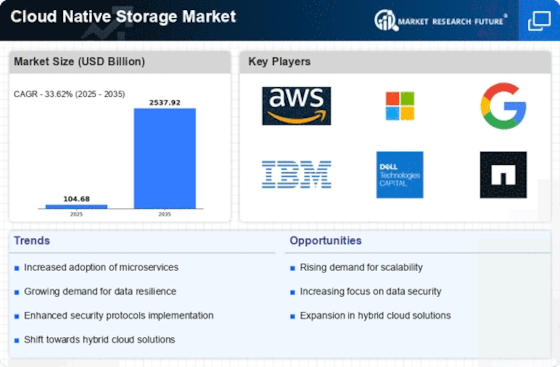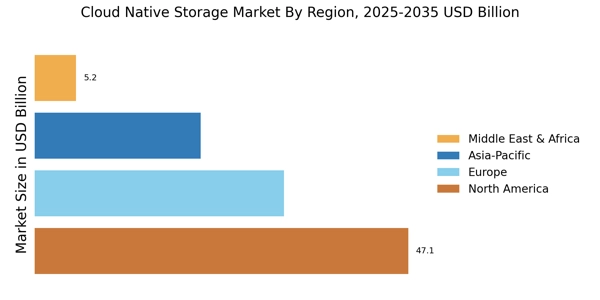Emergence of Edge Computing
The Cloud Native Storage Market is being significantly influenced by the emergence of edge computing. As more devices become interconnected, the need for efficient data processing and storage at the edge is becoming increasingly critical. Edge computing allows data to be processed closer to its source, reducing latency and improving response times. This shift is expected to drive the demand for cloud-native storage solutions that can support edge deployments. Recent projections indicate that the edge computing market could reach USD 15 billion by 2025, highlighting the potential for growth in this area. As organizations seek to harness the benefits of edge computing, the Cloud Native Storage Market is likely to adapt, offering innovative storage solutions that cater to the unique requirements of edge environments.
Increased Focus on Data Security
In the Cloud Native Storage Market, the emphasis on data security and compliance is intensifying. Organizations are increasingly aware of the risks associated with data breaches and regulatory non-compliance, prompting them to adopt robust security measures. The market is projected to grow significantly, with estimates suggesting a compound annual growth rate of 22% through 2025. This growth is largely attributed to the rising need for secure storage solutions that can protect sensitive information while ensuring compliance with various regulations. Cloud-native storage solutions are designed with security features that integrate seamlessly into existing workflows, providing organizations with the confidence to store and manage their data in the cloud. As security concerns continue to shape the landscape, the Cloud Native Storage Market is expected to evolve, offering innovative solutions that address these critical challenges.
Adoption of Multi-Cloud Strategies
The Cloud Native Storage Market is witnessing a shift towards multi-cloud strategies as organizations seek to avoid vendor lock-in and enhance their operational resilience. By leveraging multiple cloud providers, businesses can optimize their storage solutions based on specific needs, such as performance, cost, and compliance. This trend is reflected in recent surveys indicating that over 80% of enterprises are adopting multi-cloud strategies to diversify their cloud environments. The flexibility offered by multi-cloud approaches allows organizations to select the best storage solutions from various providers, thereby enhancing their overall agility. As this trend continues to gain traction, the Cloud Native Storage Market is likely to expand, driven by the demand for storage solutions that can seamlessly integrate across diverse cloud platforms.
Integration of Advanced Technologies
The Cloud Native Storage Market is experiencing a transformation due to the integration of advanced technologies such as artificial intelligence and machine learning. These technologies enable organizations to optimize their storage management processes, enhancing efficiency and reducing costs. By leveraging AI and machine learning, businesses can gain insights into their storage usage patterns, allowing for more informed decision-making regarding resource allocation. The market is projected to grow as organizations increasingly recognize the value of these technologies in improving their storage capabilities. Recent studies suggest that the adoption of AI-driven storage solutions could lead to a 30% reduction in operational costs for enterprises. As the Cloud Native Storage Market evolves, the integration of advanced technologies will likely play a pivotal role in shaping the future of storage solutions.
Rising Demand for Scalable Solutions
The Cloud Native Storage Market is experiencing a notable surge in demand for scalable storage solutions. As organizations increasingly migrate to cloud environments, the need for storage that can seamlessly scale with their data requirements becomes paramount. According to recent data, the market for cloud storage is projected to reach USD 137 billion by 2025, driven by the necessity for businesses to manage vast amounts of data efficiently. This trend indicates that companies are prioritizing flexibility and scalability in their storage solutions, which aligns with the core principles of cloud-native architectures. The ability to dynamically allocate resources allows organizations to optimize costs and performance, thereby enhancing their operational efficiency. As a result, the Cloud Native Storage Market is likely to witness sustained growth as enterprises seek to leverage scalable storage options to support their evolving data strategies.

















